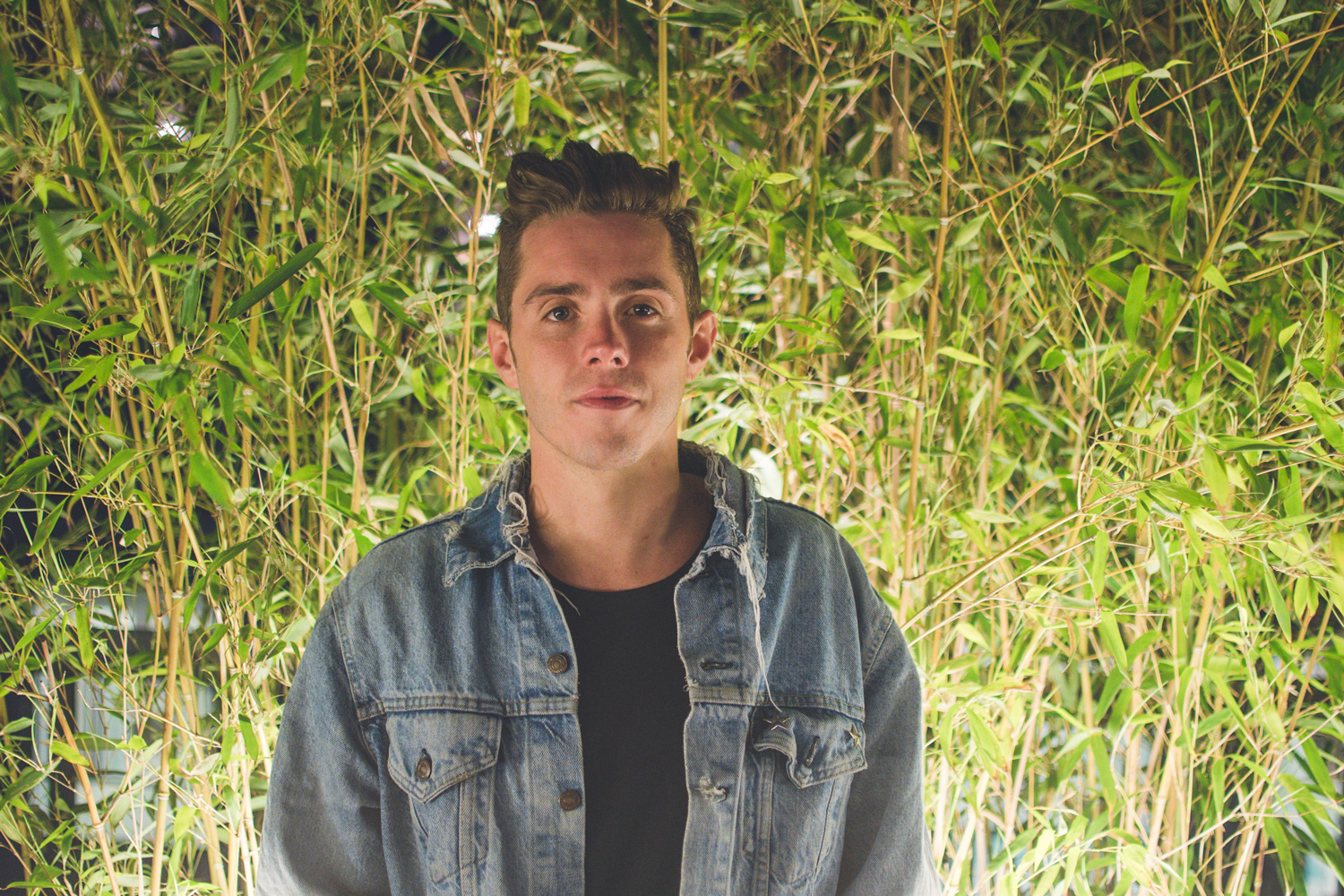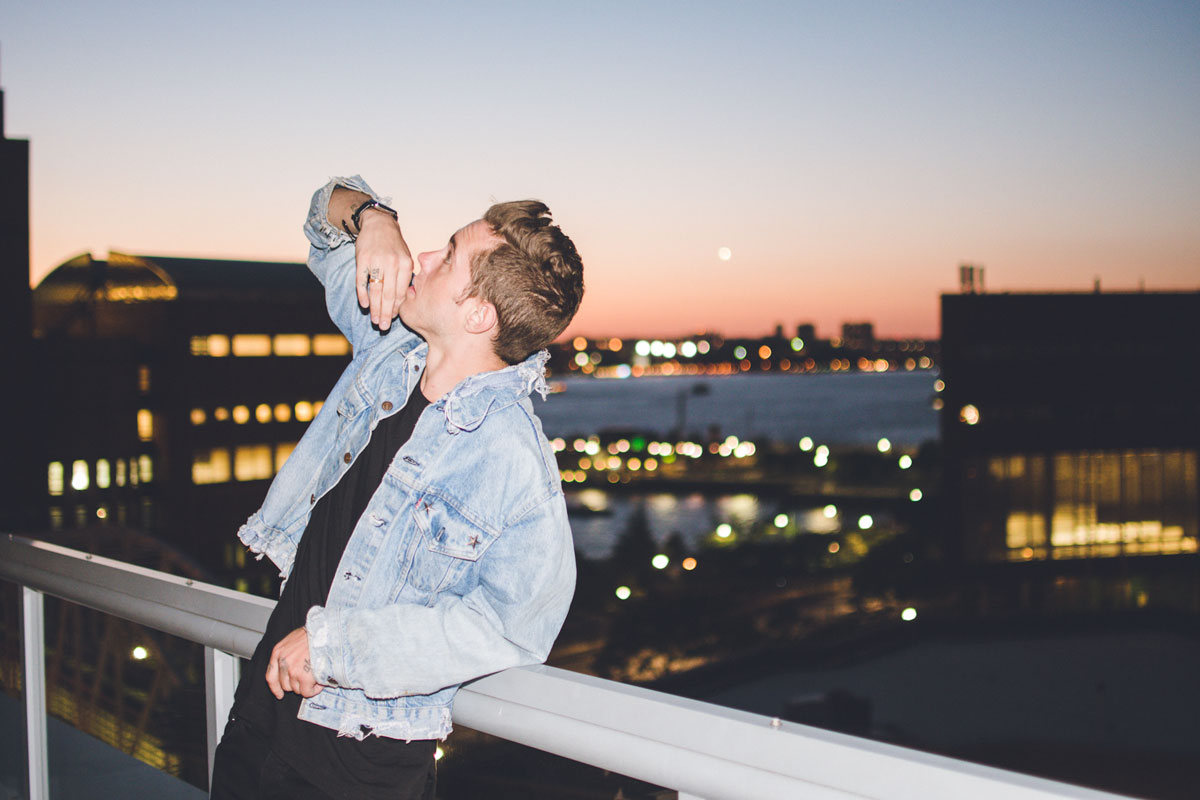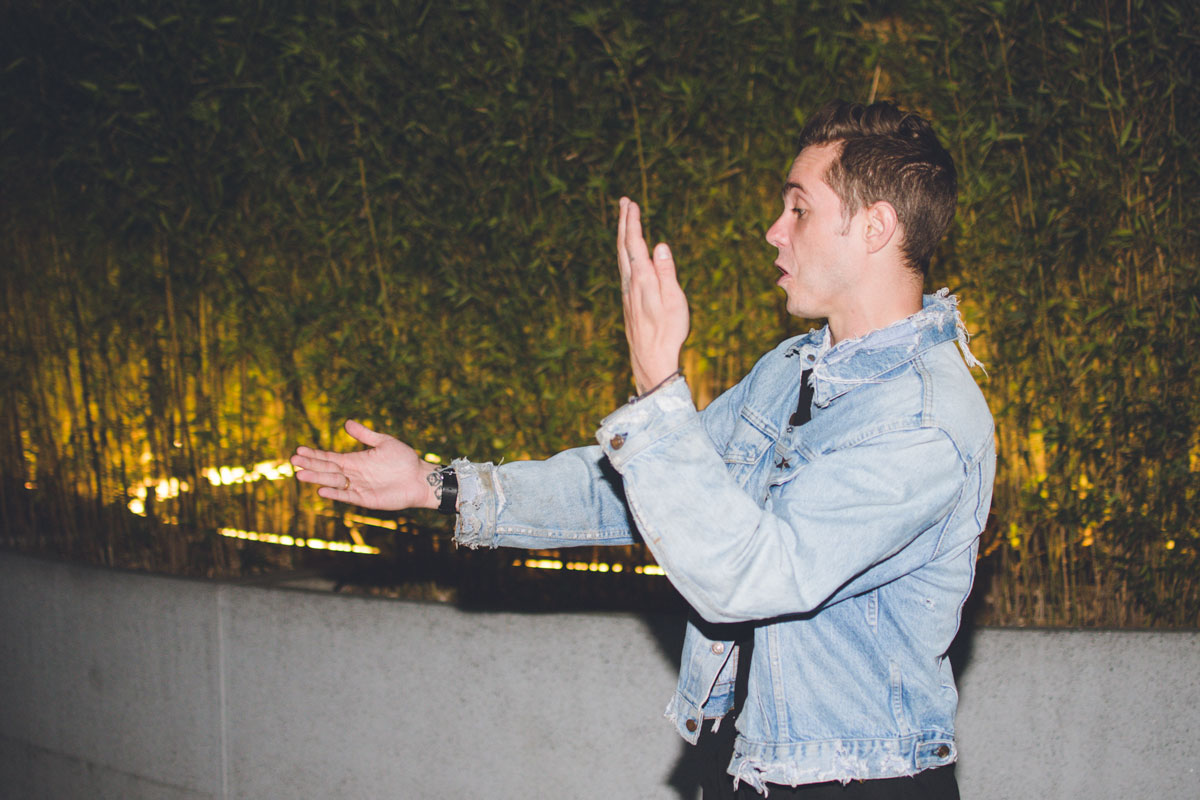“With a sound traversing multiple genres, Sammy Adams reveals how his transition through the music industry has developed his style. Being an independent artist has created room for exploration and self-expression in his most recent release, “The Long Way“.”
Interview and Photos by Mike Greene
Intro and Transcription by Mari Hercher
Mike: Your music has gone through some transitions over the past few years, from Boston Boy’s 2010 hard hitting hip-hop, to 2013’s Homecoming light-hearted sounds, and finally to this most recent The Long Ways electric-pop EDM sounds. Throughout this time, has it been more about finding what sounded right and testing different sounds, fitting in with what’s been popular, or just making music you generally enjoyed?
Sammy: I would say it’s sort of a mix of what I like and enjoy, and also testing to see what works. I haven’t really paid attention to staying current – Boston’s Boy wasn’t current at all when it came out. I’ve always been focused on staying on my roots in hip hop and reggae. It’s sort of the precursor to The Long Way as I’ve had some of these songs for almost 6 years. Boston’s boy was the precursor before I wanted to take the leap of faith into the EDM scene, which I guess now I should’ve done sooner since everyone’s on it. Now it’s funny because people are saying EDM’s going to be finished soon, and truth be told it’s not.
Mike: What are your thoughts on that aspect, that EDM might be finished soon? It’s such a saturated market where everyone is trying to sound like another artist, or someone’s that’s actually made it.
Sammy: I think the interesting part of EDM is that it’s shifted more into who’s charted and who has #1 records. More and more I see producers that I would never expect to see at EDC or EZoo, and they’re hanging out with all the artists. It’s more of a transition of them realizing that here’s the Chainsmokers and all the other guys crushing it on radio and that’s where everyone wants to go. It’s a really strong scene – there’s a lot of differences between hip-hop and EDM – the people who relate to EDM are such a strong community, and they help each other out. I’ve had a really good time making electronic music, and dancing to it. It’s such a different process than hip-hop.
“There’s a weird line between managing your expectations, and someone else managing them, because they don’t know what your expectations are.”
Mike: You mentioned earlier that for The Long Way tracks you’ve been sitting on them for 6 years. Has it been about waiting for the right moment to release them or waiting for the right production?
Sammy: It sorta has to do with the past and what direction people wanted me to go in – I was constantly just shifting towards what someone wanted, to what the next person wanted, and I really just had to take the reins and let them know that they couldn’t be a part of my growth if it was going to be a narrow minded situation, “if you don’t do this then I’m going to put a block on it” – you can’t limit an artist’s creativity, and I’m not going to make what you want me to make just so it can sound like I made it. So that was always tough because songwriters and producers who are more worried about “their cut” than anything else let that get in the way, when we should just be cutting the song and going back and making changes if we need to. It’s a really unenjoyable way to make music – I prefer to have a squad of friends, and it should be fun. When I first started making music, I wasn’t thinking “Oh, let me think about this insane radio hook I need to write!”. It all becomes very objectified when you look at hip-hop and pop music in top 40. But you go from doing things really indie and feeling natural, and that’s when your shows are the most fun – you build it with your people, and you’re not concerned about DP’s out there waiting to see your show. There’s a weird line between managing your expectations, and someone else managing them, because they don’t know what your expectations are. They only know theirs and their bosses expectations. So there’s always this business and political ceiling holding you down at a major label.
“It’s incredible to watch how other artists motivate and conduct themselves. You have to use other’s experiences to learn and keep you out of situations you don’t want to be in, because everything moves so fast and it’s all so exciting.”
Mike: That pretty much answers the next question as well, but did that contribute to the decision to leave RCA and go independent? And in addition to that, do you think that’s why there are so many independent artists out there making it on their own, thanks to Soundcloud and other platforms?
Sammy: Absolutely it contributed, and I think there’s a huge difference between what we were doing with YouTube and Facebook then and now. There are so many more apps and platforms to put yourself out there. We were so traditional, just playing tons of shows, and even after we got big, we still went and played places where we had gotten a lot of love – and it speaks volumes for fans to see that in person, as opposed to just seeing you tweeting about how well you’re doing. So I think RCA was more of an eye-opener, because when they told me to work with someone and it didn’t work out, it made me question my own music. It’s a tough process dealing with the politics of a label, and they make you question if you’re good enough to be a part of their label, and you have to jump through a lot of hoops. They have a whole unwritten rulebook that nobody questions. But ultimately it’s just the name of the game and everyone goes through it, and it made me realize I wanted to get out of my contract, and luckily I could. And now, kids are smarter than ever and finding ways to make it independently.
Mike: Well, it’s all about the grassroots these days in the sense that you set up a group where everyone builds each other up, and you produce together on these platforms and that’s why collectives have become such a huge aspect of the scene.
Sammy: I’ve always wondered about that, because all my friends have jobs or are doing their own thing – I see these artists that have posses of fifteen people and wonder what they all do!
Mike: I have a lot of friends who are DJ’s, and it starts with a lot of them just DM’ing each other sharing tracks they made and bonding over the struggle of being an entry artist.
Sammy: That opens it up, we were just at a festival playing with Party Thieves, and the few people I did know didn’t know me. And it showed me how now you need to be more than just good music, you need a good idea of who you are, because people fall in love with your personality and character. I think a lot of people miss out on that because they get caught up in this manufactured process that eventually they can’t break free of because they get too big, but with enough money you can get anywhere, so it doesn’t matter. Pharrell told me “It doesn’t matter how nasty you are, just how much money you make and if people respect you.”
“It’s good to have moments where you’re starstruck, but you have to remember to be you – because if you’re not and you meet someone again later, they’ll wonder who you really are.”
Mike: To that point, of being up on this pedestal as an artist, do you think on one side there is the artist, and on the flip side the individual? Do you think coming home to their day one’s influences their attitude and their general way of life?
Sammy: If you’re doing it right, it has to. Because it’s such a huge change from putting around in a van to a huge tour bus, that it blindsides you. And a lot of rappers talk about having a ton of stuff, but when they actually have it, it gets dangerous, because they’re unprepared. I know when I got my first check, I was blowing money for no reason. It’s both negative and positive, because you start to see the world in a more materialistic fashion. And other people weigh how “cool” you are based on who they’ve met in the past, not who you were in the past. So I try to stay down to earth by keeping the same people around, which sometimes backfires, because a best friend can become a yes man easily. But it’s definitely about who you started with and how you started with them, and I’d like to ask a lot of crews how they got started. Like you mentioned – the collective. I think the coolest part about being up on this pedestal is that if you don’t check yourself, you’re gonna get in trouble, but if you do, you’ll be able to take care of your friends and family. The more selfless aspects are the real payoff, being able to give back to people who were loyal to you from the beginning.
Mike: An artist’s music is typically a reflection of themselves, in one form or another. What does your music say about you?
Sammy: From the early album it was very… adolescent, very honest in the portrayal that I was in the mental headspace of being in college. Luckily I was able to test my music by playing for all the frats and sororities at schools like Harvard, Yale, and Princeton. It was amazing to see rap and pop and EDM crossover, and to see people get excited about someone their age doing it – I thought there would be so much more conflict in this aggressively competitive college environment. I’d say my new music is a lot more introspective, from Boston’s Boy through Homecoming to this next album. There’s a lot of me becoming comfortable with the fact that I am a songwriter, and a producer, and a rapper and singer. It’s the first time I’ve felt like all of them are in a place where I feel comfortable putting them out. And a lot of what I’ve put out in the last six months focuses less on expectations and where it will get us on charts, and more on getting back to doing it for the people who are true fans. People will always come when you have big hits, but it changes the vibe of your live show entirely if people are only there for “that one song”. It feels like you’re playing a 60 minute show to no one, and in the last five minutes everyone shows up.
Mike: Last question, what’s something you’ve learned from collaborating with so many different individuals – everyone from Mike Posner and B.O.B. to Tiesto?
Sammy: Just be yourself. There’ve been so many times I’ve been in a room with people I’m collabing with, and been so uncomfortable knowing I’m not being true to who I am. It’s so important to speak up – it took me six tries to get the right beat when I was working with Pharrell because he was pushing a beat, and I didn’t want to say no because he’s one of my favorite artists, but he just wasn’t giving me what I was looking for. And with other people, it shows much more when you believe in what you’re making. If they don’t like something you’re making, but you deliver it and really believe in it, they can’t do much about it but change it in post production. But ultimately as far as collabing, especially with people bigger than you, keep your eyes open and be humble that you have opportunity to do so. It’s incredible to watch how other artists motivate and conduct themselves. You have to use other’s experiences to learn and keep you out of situations you don’t want to be in, because everything moves so fast and it’s all so exciting. It’s good to have moments where you’re starstruck, but you have to remember to be you – because if you’re not and you meet someone again later, they’ll wonder who you really are.














